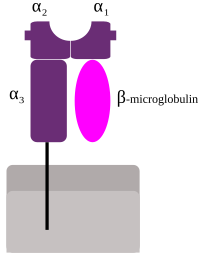
Photo from wikipedia
Islet antigen reactive T cells play a key role in promoting beta cell destruction in type 1 diabetes (T1D). Self-reactive T cells are typically deleted through negative selection in the… Click to show full abstract
Islet antigen reactive T cells play a key role in promoting beta cell destruction in type 1 diabetes (T1D). Self-reactive T cells are typically deleted through negative selection in the thymus or deviated to a regulatory phenotype. Nevertheless, those processes are imperfect such that even healthy individuals have a reservoir of potentially autoreactive T cells. What remains less clear is how tolerance is lost to insulin and other beta cell specific antigens. Islet autoantibodies, the best predictor of disease risk, are known to recognize classical antigens such as proinsulin, GAD65, IA-2, and ZnT8. These antibodies are thought to be supported by the expansion of autoreactive CD4+ T cells that recognize these same antigenic targets. However, recent studies have identified new classes of non-genetically encoded epitopes that may reflect crucial gaps in central and peripheral tolerance. Notably, some of these specificities, including epitopes from enzymatically post-translationally modified antigens and hybrid insulin peptides, are present at relatively high frequencies in the peripheral blood of patients with T1D. We conclude that CD4+ T cells that recognize non-genetically encoded epitopes are likely to make an important contribution to the progression of islet autoimmunity in T1D. We further propose that these classes of neo-epitopes should be considered as possible targets for strategies to induce antigen specific tolerance.
Journal Title: Biomedicines
Year Published: 2021
Link to full text (if available)
Share on Social Media: Sign Up to like & get
recommendations!